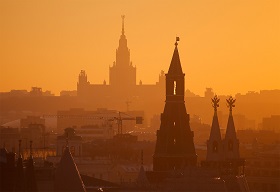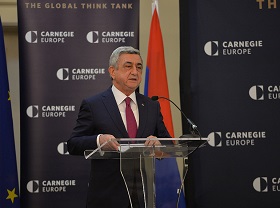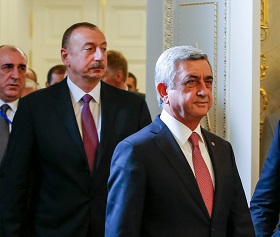In the face of unseen since the end of Cold War confrontation in the international scene, with great powers piling up their resources amid greater uncertainties in the future, the much celebrated multivector policies of Ilham Aliyev in Azerbaijan face uneasy times. A number of countries have already played the EU–EAEU card and it remains to be seen should Azerbaijan follow the model.
Even though considerable oil resources could allow a more nuanced foreign policy strategy with Russia and the West (even considering the Turkish factor), in effect that did not happen.
Will the Baku’s further “flexibility” be tolerated in Moscow, given that oil reserves are thinning, domestic political crisis is simmering and clan-fights inside the elite are not at all excluded for the last pieces of cake?
Tensions and uncertainty between Russia and the West, primarily with the United States, are dragging on and becoming more vivid — despite earlier predictions of the opposite. All traffic lights are flashing that Moscow and Washington will not quite be able to ameliorate the current situation in the near future. The latest moves of Donald Trump’s White House, particularly the 59 Tomahawk cruise missiles fired upon Syrian targets in Shayrat airbase near Homs on April 7, demonstrate that any hopes for new and real “reset” between Washington and Moscow are short sighted and surreal. That is despite President Trump’s effort to mitigate the situation by tweeting to Russia that “things will work out fine”, or sending a similar message to China — because even the Syrian operation was serving domestic political agenda. What the President’s latest public statements and Rex Tillerson’s Moscow visit show, is that in the short term future the parties agreed to stabilize the negative status quo in bilateral relations until better times come.
Not only does the situation create a negative context for bilateral relations between the two countries, but it also significantly affects the dynamics of Washington’s affairs with post-Soviet states who are now forced to make their stance clear with either of geopolitical rivals losing the former luxury of maneuvering and flexibility. Few of those nations — Ukraine and Georgia –made their choice earlier and now bet (or even rely) on the confrontation between Moscow and the West to secure their own financial wellbeing (through assistance, investments and other contributions) and political stability. The choice made transformed the countries into areas of geopolitical rivalry with all negative consequences.
Keeping this lesson in mind, other countries have been doing everything possible to walk the tightrope between Moscow and Western capitals. But the time for multivectorism seems to be running out and — in pursuit of using the lull time more efficiently — the Kremlin is more actively seeking clarity in the neighborhood.
Moldova is a case in point. This country once was on the aforementioned list, but the new President Igor Dodon already paid official visit to Moscow last January, first in ten years, to fulfill campaign promise of alleviating the difficulties faced by many Moldovan migrants in Russia, negotiate the lifting of agricultural embargos, and least doable — pick up on Transnsitrian conflict. President Dodon was also present at the Eurasian Economic Union’s (EAEU) Bishkek gathering on April 14, as Chisinau plans to be the first among those seeking observer-state status in the organization — a major U-turn from the Eastern Partnership pursuits claimed before.
In Armenia this changing spirit of the times was first noticed in summer 2013, when in the face of authoritative study on market gains after signing AA/DCFTA with Brussels and rising hostility in the region, the country’s authorities made a quick decision to drop the “deep and comprehensive” deal and stick with the Kremlin. That timely reaction allowed Yerevan to resume negotiations with Brussels after the dusk was down, and parties are arguably now planning to sign a new framework agreement in the Eastern partnership summit in fall of 2017. That was only three months before the Euromaidan in Kyiv would again upset the political stability in Ukraine. As noted above, after four years of seeking ‘understanding’ and support in Brussels, the political elite in Chisinau is gradually coming to follow Yerevan’s path. For Belarus, Alexander Lukashenko trying to be different — including with the financial support of Ilham Aliyev of Azerbaijan — but it’s becoming obvious that his potential is melting, too. Kazakhstan and other Central Asian nations, with all the baggage of internal conflicts as well as fragile political realities, have for some time been balancing between Moscow and Beijing, and the Kremlin does not seem to consider that worrying for now.
Thus, in the face of unseen since the end of Cold War confrontation in the international scene, with great powers piling up their resources amid greater uncertainties in the future, the much celebrated multivector policies of Ilham Aliyev in Azerbaijan face uneasy times. Previously Baku heavily relied on high oil and gas prices in the market and acclaimed role as European energy security contributor with its 580.000-750.000 barrels of oil per day till late 2015. With current low prices, increasing costs of drilling and thinning resources, Ilham Aliyev fought a short war in April 2016 in Nagorno Karabakh — aiming to build momentum for mounting pressures on Nagorno Karabakh and Armenia, but in vain. As a result, Baku faced the strong and consolidated position of the international mediators aimed to strengthen ceasefire regime, demonstrated during the meetings in Vienna on May 16, 2016 and especially a month later in Saint Petersburg during the presidential summit organized by Vladimir Putin. In response to Moscow’s balanced position in the OSCE Minsk Group-led peace process, anti-Kremlin sentiments in Azerbaijan started gaining traction in public sector — the media and among politicians (both heavily manufactured). A line of expert commentary, interviews and articles started to surface in the media with claims that Moscow “offended” Azerbaijan and the former shall renew its commitment to securing Ilham Aliyev’s loyalty to win hearts and minds in Azerbaijan.
This is a common posture often adopted by both Ilham Aliyev and Alexander Lukashenko before soliciting loans and other benefits — but that flexibility in relations with Moscow is about to die out.
For the sake of fairness, however, we should note that multivectorism has not always been played well by Azerbaijan. Since early days of independence in 1990s, including under Abdulfaz Elcibey and early years of Heydar Aliyev, Azerbaijan adopted a single vector foreign policy line aimed at developing relations with Turkey as a pathway of integration with the Western world. Accession to the Collective Security Treaty within the CIS in 1994 and, on the other hand, launching oil projects with Western companies did not bring balance either. Even though considerable oil resources could allow a more nuanced foreign policy strategy with Russia and the West (even considering the Turkish factor), in effect that did not happen. By April 1999, Azerbaijan withdrew from the CST, which then became a full-fledged organization, and chose GUUAM grouping in 1997 (established in NATO Washington Summit) as a format of its foreign policy coordination in the post-Soviet space — together with Ukraine, Georgia, Moldova and Uzbekistan.
A more vivid illustration of only declared, but not lived up commitments to developing relations with Moscow can be traced in conversations of Heydar and Ilham Aliyevs with their American counterparts, found in Wikileaks and other declassified records of United States — which runs against the widespread narrative of enduring strategic partnership of the two countries.
The leaked and declassified U.S. diplomatic records show that both Heydar and Ilham Aliyevs had been speaking against continued Russian engagement in the wider region and advocated for more American involvement. The verbatim record of Heydar Aliyev’s official meeting with former U.S. President Bill Clinton on August 1, 1997, shows how much the Azerbaijani President wanted to please Clinton boasting not only about fine-tuning the weather in Washington that day, but also “making a lot of effort… [for] the U.S. to become a co-chair of the Minsk Group” which to date deals with the Nagorno Karabakh peace process. “We trust you more than anyone”, said Heydar Aliyev to Clinton then, congratulating Clinton on NATO eastward expansion “despite how much Russia shouted”.
It was only two years later that the hybrid regional grouping of GUAM (Georgia, Ukraine, Azerbaijan, Moldova) was announced in the margins of NATO Washington Summit in 1999, a platform that was brought together exclusively on anti-Russian grounds.
Ten years later, in February 2010, now Ilham Aliyev — a much less seasoned diplomat that his later father — went further to use “coarse street slang” to talk about Putin and Medvedev to later argue that the latter was not “a recognised leader” among his subordinates. To contextualise, 2010 saw the peak of then President Medvedev’s personal efforts to find breakthrough on Nagorno Karabakh talks, which President Aliyev flushed in Kazan in June 2011.
Of course, the Azerbaijani leadership has long been running on the basis that the United States would rather organize color revolution on Azeri soil because they have been all under Armenian lobby. In an off-the-record sit-in with Russian journalist Vladimir Solovyov recently, according to the latter, Ilham Aliyev did not show any “adoration” of the United States. To drift the other side, Azerbaijani leadership has been managing the publicaiton of “who lost China”-style op-eds to claim Baku is angry over the poor state of Russia affairs, but that’s only short-term prank games to get higher bid in the market.
Whether or not Azerbaijan will follow the Moldovan suit and file for observer status in EAEU — remains to be seen. But will the Baku’s further “flexibility” be tolerated in Moscow, given that oil reserves are thinning, domestic political crisis is simmering and clan-fights inside the elite are not at all excluded for the last pieces of cake?







